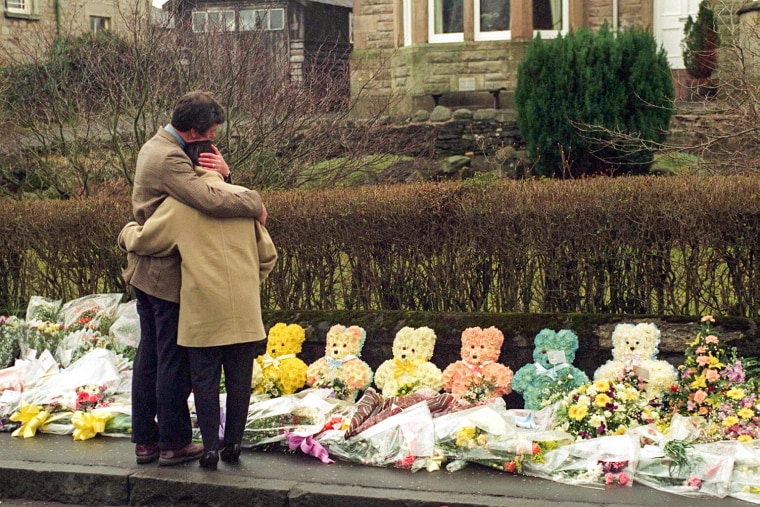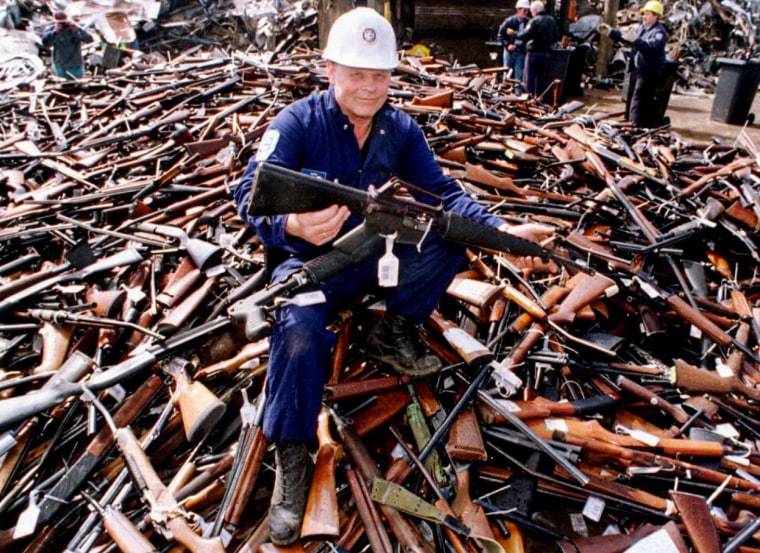Alongside the horror and condolences, there was a familiar sense of bewilderment from around the world: How can the richest superpower continue to tolerate mass shootings — school shootings, even — on a scale that dwarfs any other country?
Tuesday's elementary school massacre in Uvalde, Texas, was viewed internationally as just the latest in a long list of domestic American bloodshed that from the outside is increasingly hard to fathom.
Pope Francis called on the United States to end the "indiscriminate" sale of guns so “tragedies like this cannot occur again." French President Emmanuel Macron said he shared the "rage" of those Americans "who are fighting to end the violence." Spain’s prime minister, Pedro Sanchez, simply tweeted: "This everyday horror must stop in the U.S."
The shooting seemed doubly hard to comprehend for many in Ukraine. Losing "children to gun violence in peaceful time is a tragedy beyond understanding," tweeted Oksana Markarova, the country's ambassador in Washington.
It’s not just America’s friends, of course.
China used the incident to bolster its narrative that the U.S. is a superpower in decline, deflecting criticism of its own human rights record. The U.S. is "beset by the most serious gun violence and social discrimination," Foreign Ministry spokesperson Wang Wenbin told a daily briefing Wednesday. He called it unacceptable that "no substantive measures have been taken" to "tackle these problems."
The United States outstrips anywhere else in the world in terms of gun ownership, gun-related homicides and public mass shootings. It has 120 firearms per 100 people — more than twice as many per capita than war-torn Yemen, the next highest country on the list.
Despite having 4 percent of the world's population, the U.S. made up 31 percent of all public mass shootings globally between 1966 and 2012, according to a 2015 study by Adam Lankford, a professor of criminal justice at the University of Alabama.
When he speaks with academics abroad, they all ask him a similar question about the U.S.: "This is such an obviously terrible and tragic problem and seems to have an obvious solution — why can't they figure this out?" Lankford told NBC News by phone Wednesday. "Lack of political will? Or do Americans love their guns so much they are willing to let children die rather than give them up?"
How countries reacted to their own mass shootings
Other nations have suffered devastating mass shootings like the one in Uvalde on Tuesday, but those examples largely exist as unique stains on places that were galvanized into action.
The Dunblane school shooting in Scotland in 1996 was met with swift British legislation banning the ownership of most handguns. Automatic and semi-automatic rifles were already outlawed, and every British gun owner has to apply for a license.
While it continues to struggle with knife crime, the U.K. hasn't suffered a mass school shooting since.
Ian Blackford, a senior lawmaker with the Scottish National Party, referenced Dunblane in Parliament on Wednesday when he urged American lawmakers to "finally act to bring the scourge of gun violence that plagues the United States to an end."

The same year as Dunblane, a mass shooting that killed 35 people in Tasmania, Australia, resulted in the government banning all automatic and semi-automatic weapons, and implementing a mandatory buy-back scheme that resulted in more than 600,000 firearms being collected and destroyed.
Australian gun-related homicides decreased 7.5 percent per year following the reforms, while firearm-related suicides have also fallen, according to one Australian study.
The Australian example has been frequently cited by activists, though it has gained little traction.
And most recently, when a white supremacist murdered 51 people in two New Zealand mosques in 2019, that government acted swiftly to ban almost all automatic and semi-automatic rifles.
“When we saw something like that happen, everyone said, 'Never again,' and so it was incumbent on us as politicians to respond to that," New Zealand Prime Minister Jacinda Ardern told CBS's "The Late Show with Stephen Colbert."
"We saw something that wasn’t right and we acted on it," she added.

Other countries vary: Japan has some of the world’s strictest gun laws — and among the lowest ownership and violence rates too.
Controls are similarly strict in Iceland, where NBC News visited in 2018 to witness the rigorous testing and vetting process firsthand. Only that hasn’t deterred the Icelanders, many of whom own guns for sport, yet the country only recorded one gun-related murder in the past decade.
But what makes the U.S. such an outlier is not just the number of guns but their accessibility, according to Lankford at the University of Alabama. His research shows that most American mass shooters are not lifelong hunters or gun owners — like most people in places like Canada and Iceland — but rather they are socially isolated people who buy their weapons shortly before carrying out killings.
"Nowhere in the world is it as easy for someone who's already decided they want to kill people to get a high powered weapon that makes it easy for them to do so," Lankford said.
